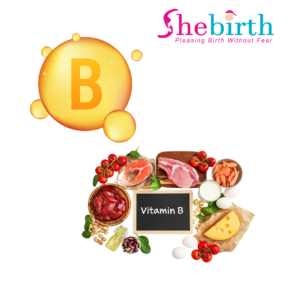Vitamin B: Essential for Energy and Cell Growth During Pregnancy

B vitamins are a group of essential nutrients that play a key role in energy production, cell growth, and overall health. These vitamins are especially important during pregnancy as they support the mother’s energy levels and contribute to the healthy development of the baby. Adequate intake of B vitamins supports a healthy pregnancy and promotes optimal growth of the fetus.
Role of B vitamins in pregnancy
B vitamins, including B1 (thiamine), B2 (riboflavin), B6 (pyridoxine), B7 (biotin), B9 (folate), and B12 (cobalamin), are essential for a variety of body functions:
Energy production: B vitamins help convert food into energy, which is essential for maintaining the increased energy demands of pregnancy.
Cell growth: These vitamins support the formation and development of new cells, which is essential for the growth of the fetus and maintaining the health of the mother.
Neurological health: B vitamins, especially B6, B9, and B12, play a vital role in the development of the baby’s brain and nervous system.
Recommended doses
Pregnant women should make sure they get enough B vitamins through diet and supplements. The recommended daily dose for each B vitamin varies:
B1 (thiamine): 1.4 mg
B2 (riboflavin): 1.4 mg
B6 (pyridoxine): 1.9 mg
B7 (biotin): 30 mcg
B9 (folic acid): 600 mcg
B12 (cobalamin): 2.6 mcg
Most prenatal vitamins contain a balanced blend of these B vitamins, ensuring pregnant women get the amounts they need for health and baby development.
Sources of B vitamins
B vitamins are found in a variety of foods, so they can be obtained through a balanced diet:
- Whole grains: Brown rice, oats, and quinoa are rich in B vitamins, especially B1, B2, and B6.
- Meat: Beef, poultry, and pork contain high amounts of B1, B6, and B12.
- Dairy: Milk and yogurt are good sources of B2 and B12.
- Leafy greens: Spinach, kale, and other leafy greens contain several B vitamins, including B9 (folate).
Supplementing with B vitamins
A healthy diet can provide many essential B vitamins, but prenatal vitamins are often recommended to ensure pregnant women meet their increased nutritional needs. These supplements often contain a comprehensive range of B vitamins for maternal and fetal health.
Always consult your doctor to ensure you are receiving the correct dose and type of B vitamins, especially if you have dietary restrictions or other health issues.
Potential side effects
B vitamins are generally safe when taken in recommended amounts. However, excessive intake of some B vitamins, especially B6, can lead to side effects such as nerve damage. Always follow the recommended doses and consult your doctor if you have any questions.
B vitamins are important for maintaining energy levels, supporting cell growth, and promoting overall health during pregnancy. By ensuring adequate intake through a combination of diet and supplementation, you can support your own health and the healthy development of your baby.
Frequently Asked Questions
1. How many vitamins are found in B complex?
B complex usually contains all eight essential B vitamins: B1, B2, B3, B5, B6, B7, B9, and B12.
2. Can B vitamins be taken during pregnancy?
Yes, it is possible to take B complex supplements during pregnancy, but it is important to choose a prenatal vitamin or supplement specifically designed for pregnancy.
3. Are B vitamins safe during pregnancy?
B vitamins are safe and necessary during pregnancy when taken at recommended doses.
4. Does vitamin B12 have an effect on pregnancy?
Vitamin B12 is essential for the development of the fetal brain and nervous system. Adequate vitamin B12 levels are important for preventing birth defects and supporting overall health during pregnancy.
5. How much B vitamins should be taken during pregnancy?
The amount depends on the specific B vitamin. For example, pregnant women should take 1.9 mg of B6 and 600 mcg of folic acid per day.
